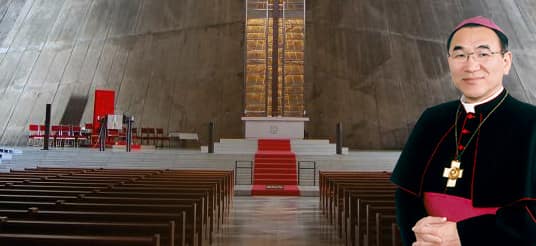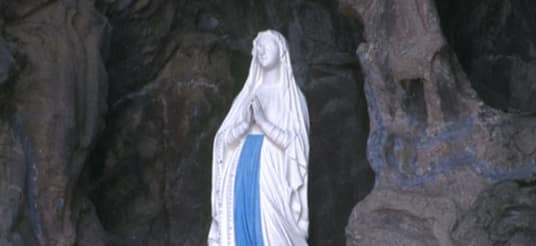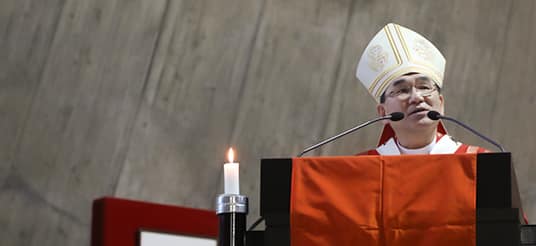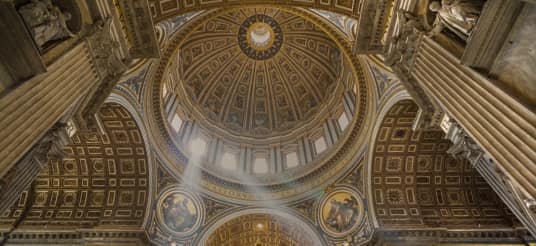Archdiocese of Tokyo

Address of Archbishop Okada at the New Year’s meeting of the Archdiocese of Tokyo.
9th January 2012, St.Mary’s Cathedral
Dear sisters and brothers in Christ!
First of all I would like to extend my cordial welcome to all of you who have gathered together here for this meeting of the New Year 2012.
1. Let’s deepen our own faith (ongoing formation of faith, one of the pastoral priorities of the archdiocese of Tokyo.)
On the 11th of March last year, 2011, Japan experienced the great disaster of the Tohoku Earthquake. This disaster poses to us many challenges. Even we who believe in a loving God are obliged to ask the following questions: Why did such a disaster occur? Why is there such evil in the world? Once again our faith is questioned when we face the tragedy that has occurred. This New Year’s gathering offers us a good opportunity to reflect again on this tragedy with the eyes of faith. Recalling to mind the time when we entered into the faith, I would like to make a great effort to deepen it. More than anything else, we must try to look at Jesus Christ carefully and listen to him with serious attention.
On the 4th of January, I had the opportunity to attend a training seminar for members of the female religious congregations of the Tokyo archdiocese. Fr. Shinichi Suzuki from the Society of St. Paul, was the guest speaker at this meeting. As you know there are four Gospels and each of the four evangelists presents different characteristics of the life of Christ. At the beginning of this New Year, I feel drawn to reflect on the different characteristics of the Gospels, for example, the Gospels of Matthew and Mark.
During the year of St. Paul, we tried to understand more deeply his teaching. This year I would like to recommend that you deepen it more. For example, please see Paul’s Letter to the Romans: chapter 8, verses 18~25, especially verse 21:
“Yet there was the hope that creation itself would one day be set free from its slavery to decay and would share the glorious freedom of the children of God.”
Nature is a wonderful sign which represents the glory of God. Nevertheless, sometimes unexpected events occur in nature, which threaten our very lives. We usually concentrate on the human level when we consider the meaning of salvation. But after March 11 of last year, I have been considering that salvation is a mystery to which humans and other creatures are linked. In other words, we participate in the mission of salvation of all creatures and of the whole universe, not only of humankind.
In Chapter 21 of the Book of Revelation, we can find the expression of a “new heaven” and a “new earth.” It is said that when God’s creation will be completed, a new heaven and a new earth will appear. God will certainly save us and this world and take it to completion. With this faith and hope let us offer this year to God.
2. The Year of Faith
From October 11, 2012, the Year of Faith will start. The Holy Father decided to commemorate the 50th anniversary of the beginning of the Second Vatican Council. The main concern of this commemorative year should be to deepen our faith.
The Holy Father says that our time is a period where faith is on the verge of a crisis. Pope Benedict 16 fulfills his duty vigorously and is preaching every day about the faith. We too, responding to his appeal, not only at a private level, but also at an ecclesial level, and as the diocese of Tokyo, would like to endeavor to deepen our faith and make concrete plans for the realization of this purpose.
The Holy Father insists also that we should try to study the “Catechism of the Catholic Church.” After the Second Vatican Council, a special synod (a meeting of representative bishops) was held and one of the conclusions was the need of a new coherent catechism, which will include the teachings of the Councils and of the Popes of the past.
The Pope at that time was John Paul II and the chief editor was cardinal Ratzinger, now Pope Benedict XVI.
What was produced after hearing the opinion of the Bishops from the whole world was a very thick and detailed book, and in Japan it took a great labor for the translation.
I recommend you to study this “Catechism of the Catholic Church.” It might be difficult to study it alone. Therefore, it is recommended that we study it together in study groups. There is also the compendium of this book which was published later.
There is another matter promulgated in the “Catechism of the Catholic Church.” It was recommended to produce in every country a user-friendly catechism which, based on the “Catechism of the Catholic Church,” will reflect the history, culture and local situation of each country. Following upon this recommendation, the Japan Bishop’s Conference has published some years ago a new book entitled “Katorikku Kyoukai no Oshie (The teaching of the Catholic Church).” I would appreciate it if you could study this book as well.
The year 2012 marks also the 150th anniversary of the re-opened catholic mission. Moreover it is also 150 years from the canonization of the 26 Japanese martyrs. On this occasion, reflecting on the history of the Japanese Church and meditating on the martyrs’ witness, we could learn together the words and means we should use to propagate the faith, and give witness to the Good News of Christ in this country.
This autumn, in October, there will be an important meeting (synod) on the topic of a new evangelization. From Japan, bishop Miyahara will attend.
Propagating the Good News with a new ardour, new methods and expression is the mission of today’s Church. The Holy Father wishes the participants to discuss this matter.
3. The year of Kizuna (bond, tight relationship)
Last year was named “the year of the bond.” We must first deepen our bond with God, and deepen the faith in the Holy Trinity, Father, Son, and Holy Spirit. This strongly requires that those who share the same faith, work hand in hand to bear witness to the presence of the Kingdom of God. Isn’t it a good time to review our relationships with our neighbors once again? What about the bishops and the priests? We are always asked. Isn’t it difficult to keep good relationships with the persons closest to us? Let us have the wisdom and courage to call to mind our family and neighbors, strengthening our bonds of cooperation and opening our hearts to one another. Let us also develop bonds of intimate relationship with those who are suffering sickness, disability and loneliness. Isn’t it important to prepare a place for them where they can feel at home?
4. The light of resurrection.
I remember some words I was told in my childhood: “Have the sun in your heart!” Later, I became a catholic as an adult, and I heard different words from many people in the countryside of Japan. The expression “Have the sun in your heart!” was brought up by Mr. Yuzo Yamamoto, a famous author. We have received the light of Christ’s resurrection, and we can light up our world, bringing hope to the people of Japan. The Japanese society seems to be in darkness. We are a very small presence, but in this darkness let us pray from our heart for the Holy Spirit’s guidance, so that each one of us may light up this world and bring courage and hope to others.
Extending my gratitude for your cooperation also this year,





